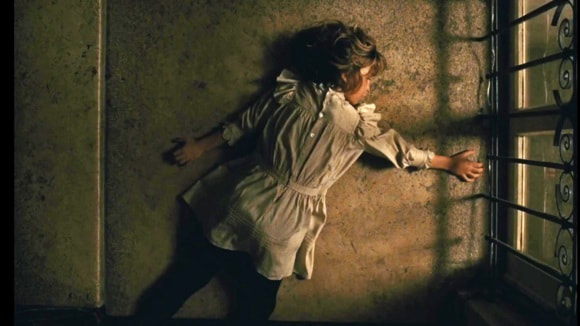Corbet doesn’t craft a consistent thesis about how an innocent turns a into world-striding monster, but that doesn’t mean his film is lacking in interesting tidbits to chew over. Prescott has nightmares of abandonment, doubting the strength of his family, the fundamental societal unit, as so many millions of others must in the unthinkable carnage of the previous four years. In the wake of that disorientation, he furiously pushes back in any way he can, which for the long-haired boy, means rage every time someone mistakes him for a girl, an assertion of masculinity in the face of emasculation. He’s fundamentally weak, so false apologies are the order of the day until he gets stronger and is able to further test the limits of what he can and cannot get away with. Whether Prescott is a stand-in for an individual leader or the whole of a country like Germany is unclear and muddled, but Corbet’s done his homework on how this specific period informed the next three decades, and a two-hour film may not have been enough for him to get across all that he wanted to.
Stripped of its historical portent, the film works as chronicle of how to deal with a frustrating child. The tools of the parents are restricted to corporal punishment and hiring more staff, the former unsuitable due to how fragile Prescott is and the latter untenable due to a string of helpers’ inability to either tolerate the boy or adhere to the strict rules that the parents try to enforce. What’s left is a battle of wills that Prescott seems uniquely suited to dominate. His imperfect and distracted parents are mere foils to their son, especially once he starts to cross lines of propriety from which there’s no going back.
The actors portraying the central family fit within the period and are well-matched to the material. In his first role, Sweet ably maintains the entitlement of a young princeling while vitally holding onto the glimpses of vulnerability that make him not yet a lost cause. The film chooses to put him on a specific course, but Sweet makes it less than an inevitability, like some amount of work might’ve been put in to turn him into a different person. Cunningham’s father, neutered at the negotiating table by the vengeful French, is equally ineffective at home, reduced to threatening and abusing a little boy to feel powerful. Bejo strikes a mysterious presence as the mother, neither able nor willing to give Prescott the unencumbered, focused love that he wants from her.
The simplest read of The Childhood of a Leader is that fascist leaders are immature prats, demanding that the world be made exactly how they like it and throwing tantrums when it can’t be done. Children pushing their toy armies in place, far away from the carnage of the real ones encountering each other, doesn’t seem so far off. Just because fits of adult anger come off in a deeper register than those embodied by children doesn’t make them any less juvenile. Corbet has more on his mind than merely ‘dictators are fussy toddlers,’ but in the absence of full coherence, shortcuts get taken. In making this austere debut, Corbet has his technique down, but, like his protagonist, age may produce a more global vision. B

 RSS Feed
RSS Feed